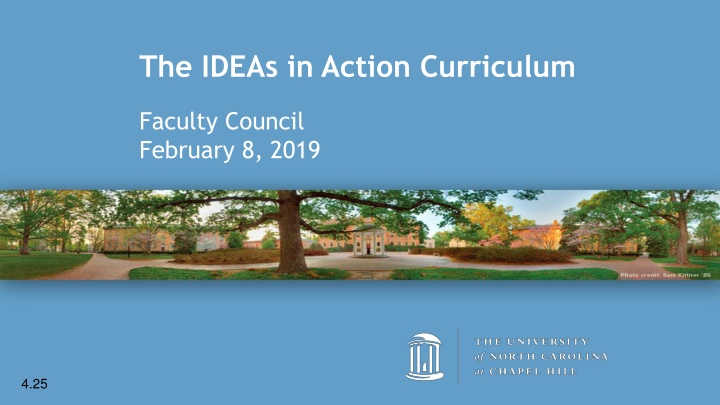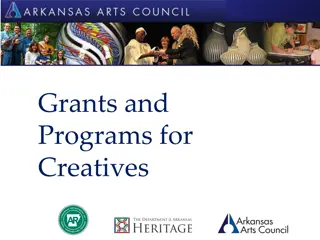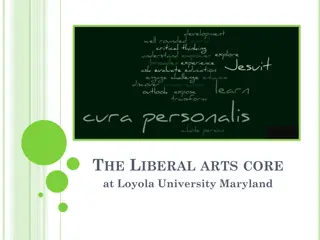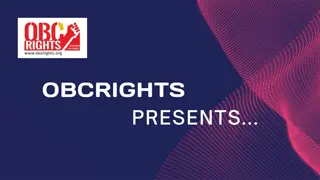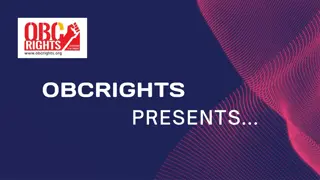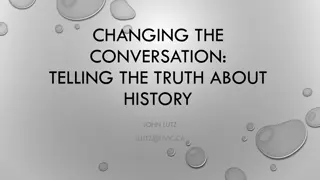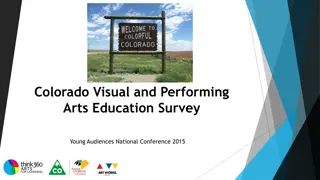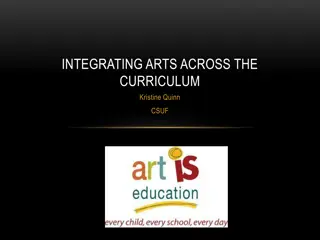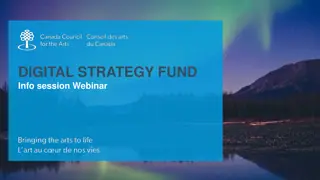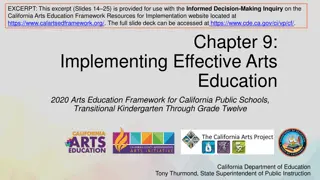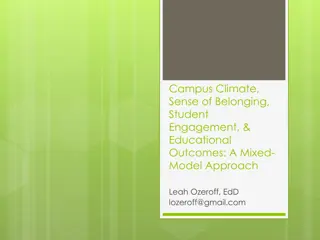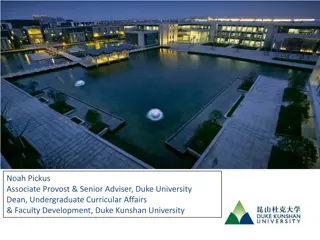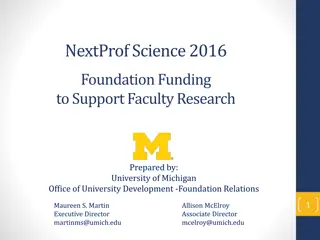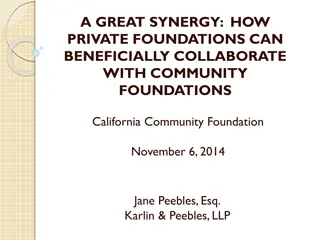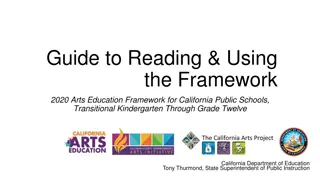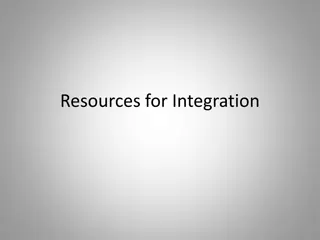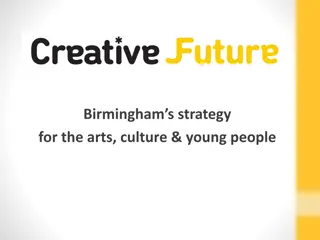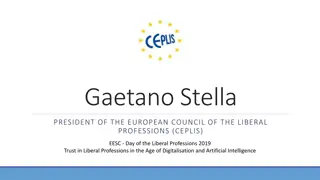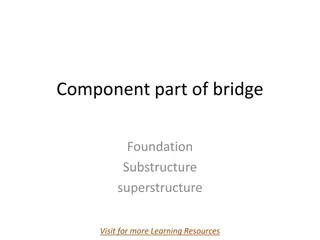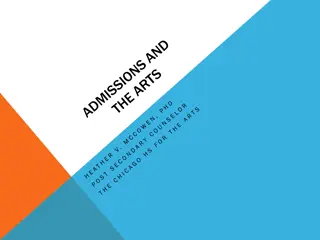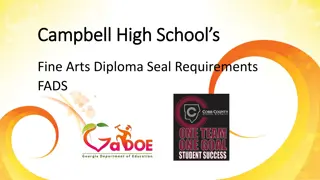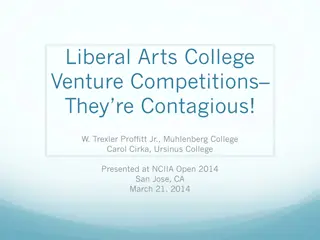Enhancing Education Through Liberal Arts Foundations and Student Engagement
Explore the intersection of liberal arts foundations with the goals of general education, focusing on ways of thinking and capacities essential for student success. Dive into research on student learning and feedback to optimize curriculum design for global engagement and scientific exploration. Embrace innovation and creativity to enhance student experiences and educational outcomes.
Download Presentation

Please find below an Image/Link to download the presentation.
The content on the website is provided AS IS for your information and personal use only. It may not be sold, licensed, or shared on other websites without obtaining consent from the author.If you encounter any issues during the download, it is possible that the publisher has removed the file from their server.
You are allowed to download the files provided on this website for personal or commercial use, subject to the condition that they are used lawfully. All files are the property of their respective owners.
The content on the website is provided AS IS for your information and personal use only. It may not be sold, licensed, or shared on other websites without obtaining consent from the author.
E N D
Presentation Transcript
The IDEAs in Action Curriculum Faculty Council February 8, 2019 4.25
DISCOVER Collect Listen Observe Investigate Experience Notice Understand Consider Synthesize IDENTIFY Communicate EVALUATE Create Innovate ACT
Liberal Arts Foundations Liberal arts general education is key How do we combine liberal arts foundation with the goals of general education? Tradition? Devolution?
Liberal Arts Foundation: Why? What is it about the liberal arts that makes them a strong foundation for students?
Capacities Ways of thinking and doing that can be used in multiple domains Not (just) skills Not course topics Reasons why students should take this course Help students understand curriculum coherently
Research on Student Learning Changing student body Thrive@Carolina Far transfer Recurrence High-Impact Practices
Feedback & Response Since November (1/3) Global Understanding & Engagement doesn t focus enough on societies beyond the US, Canada, and Western Europe Change language in capacity to emphasize societies beyond the North Atlantic region specifically Recurring capacities are too onerous, will hamper faculty teaching quality and flexibility Reduce the recurring capacities list substantially and offer additional flexibility
Feedback & Response Since November (2/3) Too little attention to natural science and to hands-on lab learning New capacity is Natural Scientific Investigation; new Empirical Investigation Lab is a fourth credit attached to a particular course. New language in Ways of Knowing; Creative Expression, Practice, and Production emphasizes science pathways Too little emphasis on data science New fourth credit on III for Foundations of Data Science; new language in Ways of Knowing emphasizes data science; new language in Quantitative Reasoning emphasizes reasoning with data
Feedback & Response Since November (3/3) Engaging with the Human Past is too broad, doesn t ensure sufficient historical distance Amended the Engaging with the Human Past capacity to require that courses must address a time period that is remote. Amended the Ways of Knowing capacity to emphasize that study of remote times or places is one way of developing that capacity. What are the mechanisms for supporting the curriculum and departments resources? College will support departments and protect against unforeseen negative consequences Dean Guskiewicz will address this in a letter to Faculty Council
First Year Foundations (12 credits) First-Year Seminar or First-Year Launch (FYS/FYL) Small, faculty-taught courses Writing at the Research University (ENGL 105) Ideas, Information, and Inquiry (III) Value of disciplinary and interdisciplinary discovery; new fields and approaches Foundational skills: Data Science, Global Awareness, Collaboration, Communication College Thriving (EDUC 101/U101) Collaboration among SOE, CAS, Student Affairs, Advising Self-regulated learning, campus resources, wellness
Focus Capacity courses (9 courses, 28 credits) Aesthetic & Interpretive Analysis Creative Expression, Practice, & Production Engagement with the Human Past Ethical & Civic Values Global Understanding & Engagement Natural Scientific Investigation Quantitative Reasoning Power, Difference, & Inequality Ways of Knowing One Focus Capacity course must carry an Empirical Investigation Lab (1 credit).
Focus Capacity courses: Recurring Capacities Comprehensive approach to a substantive topic Evidence, argument, uncertainty Writing regularly (total at least ten pages or the intellectual equivalent) Presenting material through oral presentations, webpages, or similar Human difference and/or change over time as factors Courses that do not meet one or more of these recurring capacities must include an explanation as to why such inclusion would be inappropriate for the topic area. The General Education Oversight Committee reviews these requests.
Additional Capacities & Characteristics (0+ credits) Global Language (0-12 credits) May be fulfilled through courses or other experiences: Research and Discovery (0-3 credits) High-Impact Experience (0-3 credits) Communication Beyond Carolina (0-3 credits) Campus Life Experience (0 credits)
Implementation Committee with faculty representation led by OUC Goal: Fall 2020 (if feasible) Implementation committee will return to FC with any unforeseen problems or necessary amendments College has committed to support departments and the curriculum
Questions, Comments, Feedback https://ideasinaction.unc.edu IdeasInAction@unc.edu
